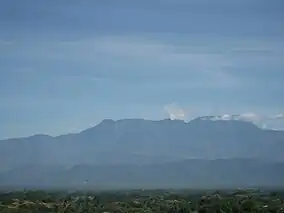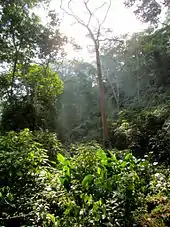Sierra de Perijá National Park
Sierra de Perijá National Park, also known as Perijá National Park, is a protected area in Venezuela. It is located in the Serranía de Perijá mountains on the border with Colombia,[1] to the southwest of Zulia state and Lake Maracaibo. The park was established in 1978 with the objective of protecting the hilly regions.[2]
| Sierra de Perijá National Park Perijá National Park | |
|---|---|
 Perijá National Park | |
.jpg.webp) Location in Venezuela | |
| Location | Venezuela |
| Nearest city | Maracaibo |
| Coordinates | 9°32′0″N 73°0′0″W |
| Area | 295,288 hectares (729,670 acres) |
| Established | 1978 |
| Governing body | Instituto Nacional de Parques(INPARQUES) ’’National Park Institute’’ |
Geography

Sierra de Perijá National Park is situated in the Perija and Colon municipalities of Zulia State. The park is accessible by road from Maracaibo.[1]
The park includes a portion of the Serranía de Perijá mountains,[3] which rises above the southwestern area of Lake Maracaibo, a large brackish bay connected to the Gulf of Venezuela. The highest elevation is Pico Tétar at 3,500 metres (11,500 ft).[1] It covers an area of 295,288 hectares (729,670 acres).[4]
Flora and fauna

The vegetation in the park consists mainly of rainforest, cloud forests, highland moors and sub-alpine and alpine tundra.[1] Some typical trees include Anacardium excelsum, wax palms Ceroxylon, Cecropia, Gyranthera caribensis, Tabebuia chrysantha, T. billbergii, T. chrysea and Podocarpus oleifolius and there are many herbs, flowering plants and bromeliads.[5][6]
The wildlife in the park includes spectacled bear, as well as capuchin and howler monkeys.[1] Dolphins in Lake Maracaibo are proposed to be brought under a protection programme through the South American River Dolphin Protected Area Network.[2]
Birds may include parrot species such as the endangered military macaw (Ara militaris).[7] An endangered bird species found in the park is the Perija metaltail hummingbird (Metallura iracunda).[8] It is also the habitat for another hummingbird, Coeligena consita, an endemic species of the Sierra de Perijá found on its southern slopes.[9] A newly discovered species of tapaculo found in the park is the Perijá tapaculo (Scytalopus perijanus) which was first described in 2015.[10]
Threats
Uncontrolled fires and deforestation are major threats to the natural ecosystems in the park.[11]
References
- "Perijá". think-venezuela.net. Retrieved 1 September 2015.
- Hoyt 2012, p. 240.
- Dallmeier & Cringan 1989, p. 300.
- "National Parks of Venezuela". World Institute for Conservation & Environment. Retrieved 1 September 2015.
- IUCN Directory of Neotropical Protected Areas. IUCN. 1982. pp. 381–. ISBN 978-0-907567-62-2.
- Soto Villalobos, José Alberto; Ferrer-Paris, José R.; Sanchez-Mercado, Ada; Grande, Jose Ramón; Cardozo-Urdaneta, Arlene; Vargas, Thayma (2016). "Sinopsis del género Tabebuia s.l. (Angiospermae: Bignoniaceae) en el estado Zulia, Venezuela". Figshare. doi:10.6084/m9.figshare.3081088.v1. Retrieved 2 July 2016.
- "Endangered and Threatened Wildlife and Plants; Two Foreign Macaw Species". Federal Register: Daily Journal of the United States Government. Retrieved 1 September 2015.
- "EN:Perija Metaltail Metallura iracunda". Birdlife International. Retrieved 1 September 2015.
- "VU:Perija Starfrontlet Coeligena consita". Birdlife International. Retrieved 1 September 2015.
- "Perijá Tapaculo: New Bird Species Discovered in Colombia, Venezuela". Sci-News.com. 12 March 2015. Retrieved 1 September 2015.
- Ferrer-Paris, José R. (2016). "Ubicación de los Incendios en la Sierra de Perijá, estado Zulia Venezuela, entre enero 2015 y marzo 2016". Figshare. doi:10.6084/m9.figshare.3116761. Retrieved 2 July 2016.
Bibliography
- Dallmeier, Francisco Gomez; Cringan, Alexander T. (1989). Biology, Conservation and Management of Waterfowl in Venezuela. Editorial Ex Libris. ISBN 978-980-6200-13-5.
- Hoyt, Erich (2 October 2012). Marine Protected Areas for Whales, Dolphins and Porpoises: A World Handbook for Cetacean Habitat Conservation and Planning. Routledge. ISBN 978-1-136-53830-8.
External links
 Media related to Sierra de Perijá National Park at Wikimedia Commons
Media related to Sierra de Perijá National Park at Wikimedia Commons